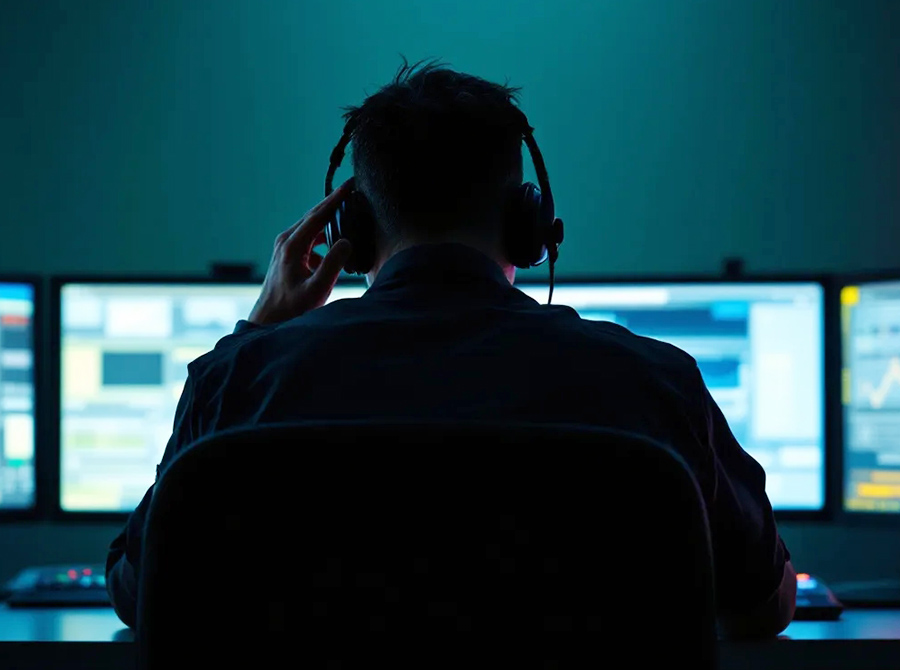Dispatchers face constant emotional and cognitive pressure. They manage life-threatening emergencies, often without closure or decompression.
Top stressors include:
- Exposure to traumatic and emotionally intense calls (vicarious trauma)
- Long shifts and mandatory overtime disrupting sleep and personal life
- High performance expectations under urgent conditions
- Lack of recognition from the public, their administration, and their peers
This ongoing stress can lead to serious mental health challenges, including:
Burnout
Burnout is emotional exhaustion caused by prolonged workplace stress. It’s common in high-pressure roles like emergency dispatch.
Common Signs:
- Irritability and emotional detachment
- Cynicism and reduced job satisfaction
- Feeling overwhelmed or undervalued
Compassion Fatigue
Compassion fatigue happens when emotional energy is depleted from constant caregiving and support.
Common Signs:
- Emotional numbness
- Decreased empathy
- Feeling disconnected from callers or colleagues
Secondary Trauma
Secondary trauma is psychological distress from repeated exposure to others’ trauma, especially through intense or frequent calls.
Common Signs:
- Flashbacks and intrusive thoughts
- Hypervigilance and insomnia
- Symptoms similar to Post Traumatic Stress Disorder (PTSD)
How to Support Dispatcher Wellness
Supporting dispatcher wellness is essential for long-term mental health and job performance. Recommended strategies include:
- Structured debriefings: Normalize post-call processing and peer support
- Resilience training: Teach emotional regulation, grounding techniques, and cognitive reframing
- Flexible recovery time: Allow breaks that reflect the emotional toll of difficult calls
- Leadership modeling: Supervisors should actively promote wellness and psychological safety
- Mental health access: Connect dispatchers with professionals familiar with emergency communications culture
- Peer support programs: Encourage open dialogue and shared coping strategies
- Recognition and validation: Acknowledge the emotional labor and impact of dispatch work
How PLS Training Supports Dispatcher Wellness and Performance
PLS training is designed to meet the unique emotional and cognitive demands of emergency dispatchers. Each monthly lesson blends practical skill-building with targeted wellness support, helping dispatchers strengthen resilience, communication, and decision-making under pressure. As part of the curriculum, a licensed psychologist contributes a monthly article focused specifically on dispatcher mental health—covering topics like burnout, compassion fatigue, and trauma recovery. This integrated approach ensures dispatchers receive both the tools and emotional insight needed to thrive in high-stress environments.
Emergency dispatchers do far more than answer calls—they absorb trauma, manage intense emotions, and carry the weight of emergencies they rarely see resolved. This emotional labor is constant, often invisible, and can take a lasting toll. Guiding someone through the worst moment of their life without your own personal closure leaves unresolved stress that builds over time. Even with a light call volume, one traumatic incident—like a drowning, suicide, or domestic violence call—can leave a deep emotional impact. Recognizing this burden is the first step toward resilience and protecting your well-being.
To navigate this emotional terrain, it helps to understand the specific types of emotional
One intense call can weigh heavily long after the shift ends. Many dispatchers carry the stress home, replaying calls or feeling distant from loved ones. Recognizing this emotional burden isn’t a weakness—it’s wisdom. Staying healthy and resilient means leaning on support, practicing self-awareness, and using tools to manage the weight of this vital work. Over the next few lessons, the Dispatcher Wellness section will help walk you through activities and techniques to help you manage the intense emotional stressors that can be present in emergency dispatching.
Want to explore tools that support dispatcher performance and wellness?
Discover how Dispatch Pro can help or request a free trial to learn more!


